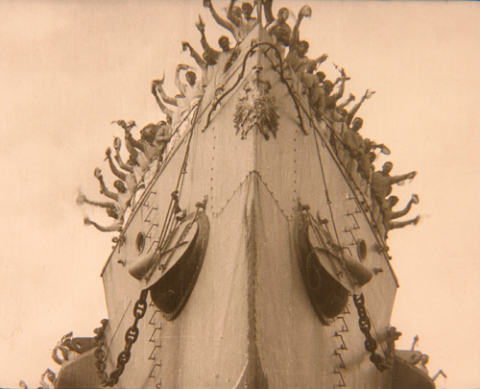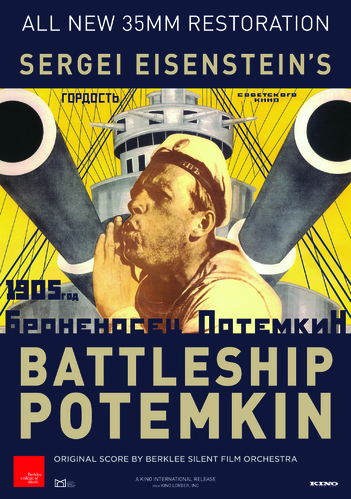Potemkin on the Potomac: Berklee Silent Film Orchestra Performs in D.C.

Sergei Eisenstein's <i>Battleship Potemkin</i> (1925)
with new original score, live on the Potomac, March 9.
Photo by Kino Lorber

A scene from <i>Battleship Potemkin</i>.
Photo by Kino Lorber

The Berklee Silent Film Orchestra performs its new original score to <i>Battleship Potemkin</i>, live
at the Kennedy Center, March 9.
Photo by Kino Lorber
When Berklee Film Scoring chair Dan Carlin was searching for a way to make the process of creating film music—film scoring—more visible to audiences, he decided to do some time travel. Before dialogue and sound effects, film was supported purely by music.
He gave some of Berklee's best student composers the daunting task of scoring an epic silent film. The newly composed score, conducted and performed live by Berklee students, would bring the music into high relief.
Carlin, previously chair of the Recording Academy (Grammys), drafted Sheldon Mirowitz, (Outside Providence, Missing in America) a decorated film composer from his faculty, to create a scoring for silent film course, and handpick the college's finest film composers and players. The result—the Berklee Silent Film Orchestra—will be heard Friday March 9, in the Kennedy Center's Terrace Theater, in Washington, D.C., when the group performs a new original score, live to Sergei Eisenstein's epic 1925 film Battleship Potemkin.
Showtime is 6:00 p.m., and while no ticket is required, these performances often exceed capacity. Early arrival is encouraged. Each year, the Conservatory Project presents America's greatest music conservatories to the public, in the Kennedy Center, free of charge. The performance will also be webcast live, and archived.
Battleship Potemkin contains some of film's most iconic images and innovative cinematography, and is routinely considered to be among the top 10 works in the history of cinema. The subject of political censorship, sometimes thoughtless editing, and the ravages of time, Potemkin presents a dramatized version of a storied 1905 mutiny of Russian sailors against their Tsarist officers. This newly struck 35mm print is the result of a painstaking, 20-year restoration that returns the film to Eisenstein's original vision and cinematic power, and makes even more evident its position as one of the most influential films of all time.
Eisenstein hoped that the film's musical score would be rewritten every 20 years, to help retain its relevance as a propaganda vehicle for each generation. The film's first score, written by Edmund Meisel in 1925, has been followed by at least six successive scores. The new score to be performed at the Kennedy Center, which was composed and first performed by the Berklee group in December 2011, is the latest.
The purpose of the Berklee Silent Film Orchestra is to bring the creativity and discipline of film composition together with the irreplaceable, without-a-net experience of live-to-picture performance. Mirowitz teaches the new course—Scoring Silent Films FS-P 485—in which the department's best students compose scene-specific cues based on original themes developed by Mirowitz. Intensive work continues throughout a 15-week semester, through rehearsals with top student musicians, culminating in a public, live-to-picture performance.
To date, Mirowitz and the Berklee students have composed and performed three silent film scores: Sunrise (1927), F.W. Murnau's masterpiece of human folly and redemption; It (1927), the jazz-age romantic comedy that made Clara Bow a star; and Battleship Potemkin (1925). Each of these performances has been mounted in the historic Coolidge Corner Theatre, in Brookline, Massachusetts.
Home to America's first and only undergraduate film scoring program, Boston's Berklee College of Music is a pioneer in the study of creating music for moving pictures. The Berklee film scoring major is populated with faculty who are active industry professionals, and is constructed to provide the kinds of realistic challenges that prepare its students for a demanding, fulfilling career. Some of the Berklee alumni prominent in the industry include Alf Clausen (The Simpsons), Howard Shore (The Lord of the Rings Trilogy), Alan Silvestri (Back to the Future, Forrest Gump, The Polar Express), and Geoff Zanelli (The Pacific, Disturbia). In the fall of 2012, the college will begin offering its first graduate degree in film scoring at its new campus in Valencia, Spain.
